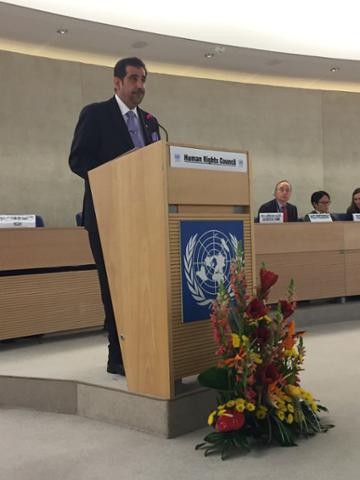3 March 2015 – Geneva, Switzerland – Americans for Democracy & Human Rights in Bahrain, the Bahrain Center for Human Rights and the Bahrain Institute for Rights and Democracy take this opportunity to respond to the statement made today by Undersecretary of Foreign Affairs of Bahrain, Abdullah Abdullatif Abdullah, at the 28th Session of the United Nations (UN) Human Rights Council (HRC). We disagree with the Government’s optimistic assessment of reform efforts in the country. We urge the international community to continue to call on Bahrain to cease further deteriorating the status of human rights in the kingdom and urgently recommit to fulfilling its international human rights obligations.
In his statement, the Undersecretary reiterated, “[the] kingdom’s commitment to implementing the legal safeguards enshrined in the constitution and in the various national legislatures. We will continue to honor our pledges to the united nations and its bodies… And that the promotion and protection of human rights is indispensable.”
Since the last session of the Human Rights Council in September 2014, Bahrain has increased restrictions on civil society and political opposition groups. The government has expanded its ability to utilize pre-trial detention to incarcerate individuals without due process, and has continued its systematic use of torture to coerce confessions and detain voices of dissent. Since September, the government has used these powers to arrest and charge Bahrain’s most prominent human rights defenders and leading political opposition figures. Bahrain has also extra judicially revoked the citizenship of additional human rights defenders, lawyers, teachers, journalists and others who have criticized the government, and has arbitrarily sentenced dissidents to death on unsubstantiated charges of terrorism.
Particularly concerning has been the charges against Nabeel Rajab, President of the Bahrain Center for Human Rights, less than 24 hours after returning from advocating for Bahraini human rights reform at the Human Rights Council and in the European Union. Such blatant acts of reprisals directly undermine the Undersecretary’s claims that the Government prioritizes and respects international standards of human rights.
In spite of these ongoing abuses, the various human rights institutions highlighted in the Undersecretary’s statement have failed to either criticize or counteract these destructive developments. The Ministry of Interior’s Ombudsman continues to lack the necessary independence to properly and effectively carry out his mandate. Meanwhile, despite the limited progress represented in the National Institution for Human Rights’ First Annual Report, the government has failed to implement any of the report’s recommendations.
The Government of Bahrain likewise continues to disregard its commitments to international human rights standards. Since the 27th Session of the HRC, Bahrain has continued to neglect its commitments under the International Covenant on Civil and Political Rights (ICCPR), the Convention against Torture (CAT), the Convention on the Rights of the Child (CRC), and the Convention for the Elimination of all forms of Discrimination against Women (CEDAW). Furthermore, Bahrain still has yet to accomplish any meaningful implementation of the vast majority of the 158 recommendations the kingdom accepted during its 2012 Universal Periodic Review (UPR).
Therefore, ADHRB, BCHR and BIRD call upon United Nations Member States, the Human Rights Council and the Office of the High Commissioner for Human Rights to urge the Government of Bahrain to:
- Recommit to a full, transparent and expeditious implementation of the recommendations from Bahrain’s 2012 Second Cycle Universal Periodic Review and the Bahrain Independent Commission of Inquiry and;
- Fulfill its international commitments to uphold international standards of human rights, including the ICCPR, CAT, CRC, and CEDAW, and ratify the optional protocols of the major international human rights treaties;
- Release all individuals detained in relation to their expression of their human rights, including human rights defenders, journalists, photographers, doctors and medics, and religious and political opposition figures, especially those found to be arbitrarily detained by the UN Working Group on Arbitrary Detention and other Special Procedures;
- Conclude negotiations with OHCHR to establish a full mandate country office in Bahrain that includes both a technical capacity building and a reporting mandate and enjoys full and unfettered access to the country.
A PDF of this statement is available here.
لرجاء الضغط هنا لقراءة هذه الرسالة باللغة العربي





